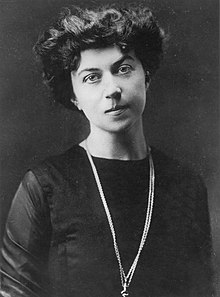
Back Aleksandra Kollontai Afrikaans ألكسندرا كولونتاي Arabic الكسندرا كولونتاى ARZ Alexandra Kollontai AST Aleksandra Kollontay AVK Aleksandra Kollontay Azerbaijani Коллонтай Александра Михайловна Bashkir Aleksandra Kollontai BCL Аляксандра Міхайлаўна Калантай Byelorussian Аляксандра Калантай BE-X-OLD
Alexandra Kollontai | |
|---|---|
| Александра Коллонтай | |
 Kollontai, c. 1900 | |
| People's Commissar of State Protection of the RSFSR | |
| In office 1917–1918 | |
| Personal details | |
| Born | Alexandra Mikhailovna Domontovich 31 March 1872 Saint Petersburg, Russian Empire |
| Died | 9 March 1952 (aged 79) Moscow, Russian SFSR, Soviet Union |
| Resting place | Novodevichy Cemetery, Moscow |
| Nationality | Russian |
| Political party | VKP(b) |
| Other political affiliations | RSDLP (1899–1906) RSDLP (Mensheviks) (1906–1915) RSDLP (Bolsheviks) (1915–1918) RKP(b) (1918–1925) |
| Spouse(s) | Vladimir Ludvigovich Kollontai Pavel Efimovich Dybenko |
| Children | Mikhail Vladimirovich Kollontai |
| Occupation | professional revolutionary, writer, diplomat |
| Signature |  |
Alexandra Mikhailovna Kollontai (Russian: Александра Михайловна Коллонтай; née Domontovich, Домонтович; 31 March [O.S. 19 March] 1872 – 9 March 1952) was a Russian revolutionary, politician, diplomat and Marxist theoretician. Serving as the People's Commissar for Welfare in Vladimir Lenin's government in 1917–1918, she was a highly prominent woman within the Bolshevik party. She was the first woman in history to be a cabinet minister, and the first woman ambassador.[1][2]
The daughter of an Imperial Russian Army general, Kollontai embraced radical politics in the 1890s and joined the Russian Social Democratic Labour Party (RSDLP) in 1899. During the RSDLP ideological split, she sided with Julius Martov's Mensheviks against Lenin's Bolsheviks. Exiled from Russia in 1908, Kollontai toured Western Europe and the United States and campaigned against participation in the First World War. In 1915, she broke with the Mensheviks and became a member of the Bolsheviks.
Following the 1917 February Revolution which ousted the tsar, Kollontai returned to Russia. She supported Lenin's radical proposals and, as a member of the party's Central Committee, voted for the policy of armed uprising which led to the October Revolution and the fall of Alexander Kerensky's Provisional Government. She was appointed People's Commissar for Social Welfare in the first Soviet government, but soon resigned due to her opposition to the peace treaty of Brest-Litovsk in the ranks of the Left Communists.
In 1919, Kollontai was a leading figure in the foundation of the Zhenotdel, the then-new women's department of the Central Committee that was aimed at improving the status of women in the Soviet Union. She was a champion of women's liberation, and later came to be recognized as a key figure in Marxist feminism.
Kollontai was outspoken against bureaucratic influences over the Communist Party and its undemocratic internal practices. To that end, she sided with the left-wing Workers' Opposition in 1920, but was eventually defeated and sidelined, narrowly avoiding her own expulsion from the party altogether. From 1922 on, she was appointed to various diplomatic posts abroad, serving in Norway, Mexico and Sweden. In 1943, she was promoted to the title of ambassador to Sweden. Kollontai retired from diplomatic service in 1945 and died in Moscow in 1952.
- ^ Zukas, Alex (20 April 2009), "Kollontai, Alexandra (1872-1952)", in Ness, Immanuel (ed.), The International Encyclopedia of Revolution and Protest, Oxford, UK: John Wiley & Sons, Ltd, pp. 1–2, doi:10.1002/9781405198073.wbierp0858, ISBN 978-1-4051-9807-3, retrieved 2 May 2023,
Alexandra Kollontai, nee Domontovich, who held the distinctions of being the first woman cabinet minister and the first woman ambassador
- ^ Boynton, Victoria; Malin, Jo, eds. (2005). "Aleksandra Kollontai". Encyclopedia of Women's Autobiography. p. 326. ISBN 978-0-313-32739-1.
In the first Soviet government, formed in the fall of 1917, Kollontai was appointed people's commissar (minister) for social welfare. She was the only woman in the cabinet but also the first woman in history who became a member of the government.